|
|
|
Sort Order |
|
|
|
Items / Page
|
|
|
|
|
|
|
| Srl | Item |
| 1 |
ID:
175461
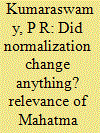

|
|
|
|
|
| Summary/Abstract |
Mahatma Gandhi’s 1938 statement that ‘Palestine belongs to the Arabs’ has not lost its relevance even after India reversed its four-decade-old policy of recognition-without-relations and normalised relations with Israel in January 1992. Critics see growing Indo-Israeli relations as an abandonment of Gandhian values while supporters use the 1938 statement to reiterate India’s continued support for the Palestinians.
|
|
|
|
|
|
|
|
|
|
|
|
|
|
|
|
| 2 |
ID:
138445
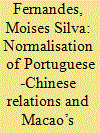

|
|
|
|
|
| Summary/Abstract |
Although many people believe that small or medium powers tend to be very concerned with overseas territories, this was not true in the case of Macao. The great power, mainland China, showed very little interest in foreign affairs, because it knew that the outcome of the handover would be in its favour. Nonetheless, from May 1974 to July 1975, both China and Portugal had to demarcate their positions. The Portuguese entered into informal conversations with the Chinese ambassador to France, Zeng Tao, in August 1975, which lasted until January 1978, a total of almost three years. As soon as power in mainland China shifted from the leftists to the moderates, however, the new ambassador in Paris, Han Kehua, made it clear that he wanted things settled in six months. However, in 1978, the Portuguese cabinet had three different prime ministers and three different ministers of foreign affairs. Ultimately, the Portuguese cabinet had to give in to mainland China, on 8 February 1979.
|
|
|
|
|
|
|
|
|
|
|
|
|
|
|
|
| 3 |
ID:
170584
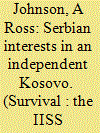

|
|
|
|
|
| Summary/Abstract |
Intra-Serbian dialogue is as necessary for normalisation as is resumed dialogue between Belgrade and Pristina.
|
|
|
|
|
|
|
|
|
|
|
|
|
|
|
|
| 4 |
ID:
161367
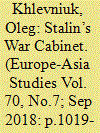

|
|
|
|
|
| Summary/Abstract |
Amid the extensive literature on the Stalinist dictatorship during the 1930s and the postwar period, the gap in scholarship on the Soviet leadership during the war years is particularly noticeable. This article fills that gap. Stalin’s war cabinet is characterised according to several criteria: first, the formal status of members of the leadership; second, the system of delegating authority; third, the functioning and competency of the structure of collective leadership; and fourth, Stalin’s loyalty to his top associates and the degree of their political immunity. The article demonstrates that the war years saw a relative ‘normalisation’ of the dictatorship. These important changes influenced the subsequent development of the Stalinist system of power and the evolution of Soviet authoritarianism after the dictator’s death.
|
|
|
|
|
|
|
|
|
|
|
|
|
|
|
|
| 5 |
ID:
148256
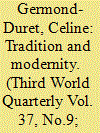

|
|
|
|
|
| Summary/Abstract |
The debates over Indigenous peoples and development are often framed within the discussion on the shift towards modernity, the imposition of economic liberalism and resistance against external interventions, with a tendency to see Indigenous peoples as a possible alternative to the world economic order. However, looking at many development agencies’ discourses, the idea that Indigenous peoples will actually benefit from modernity prevails. The literature is divided along these two conflicting views and dominated by binary oppositions: traditional/modern; backward/advanced; sustainable/unsustainable, etc. This article discusses the tradition/modernity dichotomy and raises the following questions: is it relevant to think in terms of modernity/tradition in the case of Indigenous peoples? What does the use of such a dichotomy imply? What is the alternative? The article demonstrates that this binary opposition is neither relevant nor desirable, and that a new analytical framework is required. Instead, it proposes using a normalisation framework, which focuses on the attempts made to ‘normalise’ Indigenous peoples and to encourage them to comply with existing social and economic models.
|
|
|
|
|
|
|
|
|
|
|
|
|
|
|
|
|
|
|
|
|